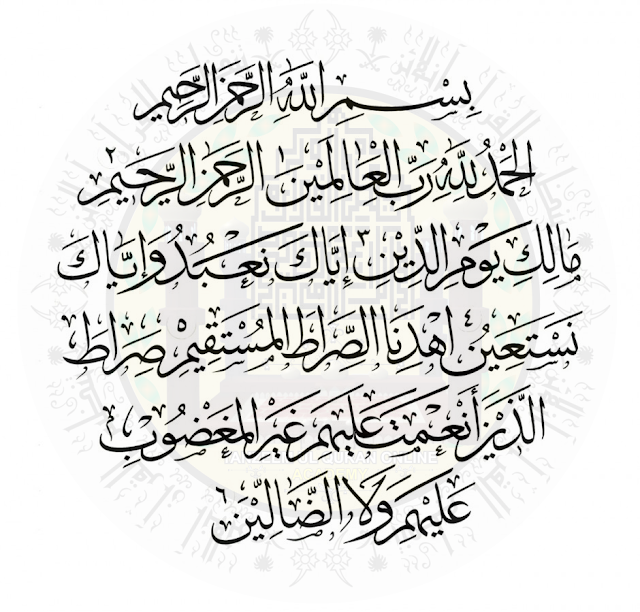The Number of Words and Letters in Al-FatihahThe scholars say that Al-Fatihah consists of twenty-five words, and that it contains one hundred and thirteen letters.
|
إِنَّهَا مِنَ السَّبْعِ الْمَثَانِي وَالْقُرْآنِ الْعَظِيمِ الَّذِي أُعْطِيتُهُ
(It is the seven repeated verses and the Glorious Qur'an that I was given.)
At-Tirmidhi then commented that this Hadith is Hasan Sahih.
There is a similar Hadith on this subject narrated from Anas bin Malik
Further, `Abdullah, the son of Imam Ahmad, recorded this Hadith from Abu
Hurayrah from Ubayy bin Ka`b, and he mentioned a longer but similar wording for
the above Hadith. In addition, At-Tirmidhi and An-Nasa'i recorded this Hadith
from Abu Hurayrah from Ubayy bin Ka`b who said that the Messenger of Allah
said,
مَا أَنْزَل اللهُ فِي
التَّورَاةِ وَلَا فِي الْإِنْجِيلِ مِثْلَ أُمِّ الْقُرْآنِ وَهِيَ السَّبْعُ
الْمَثَانِي وَهِيَ مَقْسُومَةٌ بَيْنِي وَبَيْنَ عَبْدِي
نِصْفَيْنِ
(Allah has never revealed in the Tawrah or the Injil anything similar to Umm
Al-Qur'an.
It is the seven repeated verses and it is divided into two halves between
Allah and His servant.)
This is the wording reported by An-Nasa'i. At-Tirmidhi said that this Hadith
is Hasan Gharib.
Also, Imam Ahmad recorded that Ibn Jabir said, "I went to the Messenger of
Allah after he had poured water (for purification) and said, `Peace be unto you,
O Messenger of Allah!' He did not answer me. So I said again, `Peace be unto
you, O Messenger of Allah!' Again, he did not answer me, so I said again, `Peace
be unto you, O Messenger of Allah!' Still he did not answer me. The Messenger of
Allah went while I was following him, until he arrived at his residence. I went
to the Masjid and sat there sad and depressed. The Messenger of Allah came out
after he performed his purification and said, (Peace and Allah's mercy be unto
you, peace and Allah's mercy be unto you, peace and Allah's mercy be unto you.)
He then said, (O `Abdullah bin Jabir! Should I inform you of the best Surah in
the Qur'an) I said, `Yes, O Messenger of Allah!' He said, (Read, `All praise be
to Allah, the Lord of the existence,' until you finish it.)'' This Hadith has a
good chain of narrators.
Some scholars relied on this Hadith as evidence that some Ayat and Surahs
have more virtues than others.
Furthermore, in the chapter about the virtues of the Qur'an, Al-Bukhari
recorded that Abu Sa`id Al-Khudri said, "Once, we were on a journey when a
female servant came and said, `The leader of this area has been poisoned and our
people are away. Is there a healer among you' Then a man whose healing expertise
did not interest us stood for her, he read a Ruqyah for him, and he was healed.
The chief gave him thirty sheep as a gift and some milk. When he came back to us
we said to him, `You know of a (new) Ruqyah, or did you do this before' He said,
`I only used Umm Al-Kitab as Ruqyah.' We said, `Do not do anything further until
we ask the Messenger of Allah.' When we went back to Al-Madinah we mentioned
what had happened to the Prophet . The Prophet said,
وَمَا كَانَ يُدْرِيهِ أَنَّهَا رُقْيَةٌ اقْسِمُوا وَاضْرِبُوا لِي بِسَهْمٍ
(Who told him that it is a Ruqyah Divide (the sheep) and reserve a share for
me.)''
Also, Muslim recorded in his Sahih, and An-Nasa'i in his Sunan that Ibn
`Abbas said, "While Jibril (Gabriel) was with the Messenger of Allah , he heard
a noise from above. Jibril lifted his sight to the sky and said, `This is a door
in heaven being open, and it has never been opened before now.' An angel
descended from that door and came to the Prophet and said, `Receive the glad
tidings of two lights that you have been given, which no other Prophet before
you was given: the Opening of the Book and the last (three) Ayat of Surat
Al-Baqarah. You will not read a letter of them, but will gain its benefit.'''
This is the wording collected by An-Nasa'i (Al-Kubra 5:12) and Muslim recorded
similar wording (1:554).







0 comments:
Post a Comment